List Of Yoga Poses To Relieve Chest Pain: A Quick Guide
Alleviate all heart, lungs, and food pipe-related aches with easy-to-follow postures.

Image: shutterstock
Chest pain and tightness is a common issue faced by many people. It is best to regularly do certain yoga poses to relieve chest pain.
Chest pain may not necessarily point toward a heart problem. If you are a working professional, sitting hunched on a chair for long hours can also trigger chest tightness. Anxiety and tension may also add to this problem.
The key here is to breathe in, relax, and do yoga asanas before it becomes a bigger problem. But, which yoga poses should you do to reduce chest pain?
For your convenience, we have curated a list of the 8 best yoga poses for chest pain. These will help open up the chest muscles by gently stretching them. But first, find out the main causes of chest pain. Scroll down to learn more!
In This Article
What Causes Chest Pain?
Chest pain is caused due to various reasons. You can feel it anywhere from your neck to your upper abdomen. Chest tightness often occurs due to poor posture but could also be a sign of something more serious like a panic or a heart attack.
A survey conducted on PubMed, EMBASE, and other relevant databases found that chest pain is the second most common reason for US adults to visit the emergency department (ED). It accounts for more than 4.7% of all ED visits and only 5.1% are acute coronary syndrome cases. Additionally, its lifetime prevalence in the country is 20% to 40%, with women more likely to experience it than men.
If you feel an ache in your chest area, it might not necessarily be a cardiovascular disease. Or it could be. When your heart muscles do not get enough oxygen, it gives rise to a severe form of chest pain called angina.
Other heart-related chest pains are a heart attack, pericarditisi Swelling of the sac-like structure around the heart, leading to infection and potential surgery. , myocarditisi Inflammation of the heart muscle caused by viral, bacterial, fungal, or parasitic infections. , cardiomyopathyi A condition that makes it difficult for the heart to pump blood and deliver it to the rest of the body, often leading to heart failure. and aortic dissectioni The tear in the inner layer of the main artery that causes pain similar to a heart attack and can be fatal. .
Chest pain occurs due to gastrointestinal problems too. If you have swallowing problems, gallstones, inflammation of the gallbladder or pancreas, then you will feel pain in the chest.
Even if you have pneumonia, asthma or blood clots, it leads to chest ache. Chest pain also occurs when you suffer from a fracture that causes pressure on the nerves. Damaged ribs and sore muscles from extreme exertion are also main factors causing chest ache.
Key Takeaways
- Yoga reduces chest tightness by opening, expanding, and stretching your chest.
- Bhujangasana stretches the muscles in your chest and shoulders and improves blood and oxygen circulation.
- Chakrasana is good for the heart and treats asthma. It stretches the lungs, stimulates the thyroid, and relieves stress and tension in the body.
Yoga For The Chest
You must get a physician to evaluate any sudden chest pain you feel and get checked for heart problems. If that’s not the case, then you can soothe your chest muscles with yoga.
Yoga helps in reducing chest tightness by opening, expanding and stretching the chest. It counters the effects of poor posture, overuse, and strain of muscles, by fixing the cause of the problem.
Yoga improves your range of motion, stretches your pectoral muscles, improves your flexibility which all aid in eradicating your chest pain.
Sometimes, even stress, anxiety and tension can cause chest pain, and you know well that yoga is the best solution for it.
Note: Consult a doctor to check any significant health conditions or injuries before beginning any yoga workouts, especially if you have chronic chest pain. Never ignore your body’s signals and avoid any poses that cause discomfort.
Yoga-Based Rehabilitation After Heart Attack
Yoga is an effective solution for rehabilitation after an acute heart attack and other heart issues. It can help improve self-rated health and return to your regular activities after cardiovascular issues like a stroke or a heart attack. According to a study, it was found that self-rated health at 12 weeks was 77 points in the yoga-based rehabilitation group and 75.7 points in the enhanced standard care group. Check out the graph below to know more.
Self-rated Health Of Patients Following Cardiac Rehabilitation Programs
Source: Yoga-Based Cardiac Rehabilitation After Acute Myocardial Infarction: A Randomized Trial.Practice the chest pain relieving poses mentioned below to understand what I am talking about.
8 Best Poses In Yoga For Chest Pain Relief
- Matsyasana (Fish Pose)
- Bhujangasana (Cobra Pose)
- Dhanurasana (Bow Pose)
- Bitilasana (Cow Pose)
- Ustrasana (Camel Pose)
- Chakrasana (Wheel Pose)
- Natarajasana ( Dance Pose)
- Tadasana (Mountain Pose)
1. Matsyasana (Fish Pose)
About The Pose-
Matsyasana or the Fish Pose is named after the Matsya avatar of Lord Vishnu. It is a beginner level Hatha yoga asana. Practice it in the morning on an empty stomach for best results and hold the pose for at least 30 to 60 seconds to feel the pose’s effect.
Benefits For The Chest- Matsyasana stretches your rib muscles. It also stretches the front and back of your neck and improves your posture. It is therapeutic for rounded-shoulders and relieves irritation.
How To Perform
- Sit on the yoga mat with your legs extended. Keep your toes pointed upward.
- Place your forearms firmly on the mat beside the hips.
- Press elbows into the floor, lifting only your chest, as you gently tilt your head back.
- Gently rest the crown of your head on the floor.
- Hold for a few breaths, then release.
2. Bhujangasana (Cobra Pose)
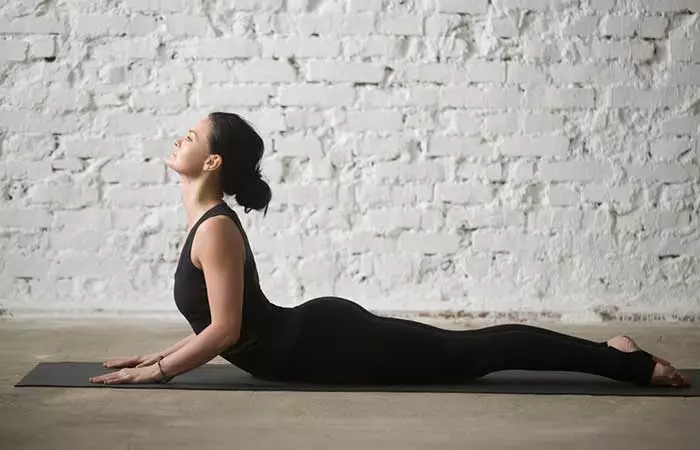
About The Pose- Bhujangasana or the Cobra Pose is an asana that resembles the raised hood of a cobra. It is a backbend. The pose is a beginner-level Ashtanga yoga asana. Practice it in the morning on an empty stomach and hold the pose for 15 to 30 seconds.
Benefits For The Chest- Bhujangasana stretches the muscles of your chest and shoulders. It increases your flexibility and improves your mood. The pose improves blood and oxygen circulation. Jesse Janelle, a yoga teacher, says, “It elongates and opens the chest and can be modified to any flexibility level. It can also be helpful to relieve the upper back to reduce tension on the front of the chest.”
How To Perform
- Lie on your stomach with palms under your shoulders.
- Press your palms into the floor, lifting your chest. Keep your arms slightly bent at the elbows.
- Roll your shoulders back and gaze forward or slightly upward.
- Hold the pose for a few breaths, then gently lower your chest back down.
3. Dhanurasana (Bow Pose)
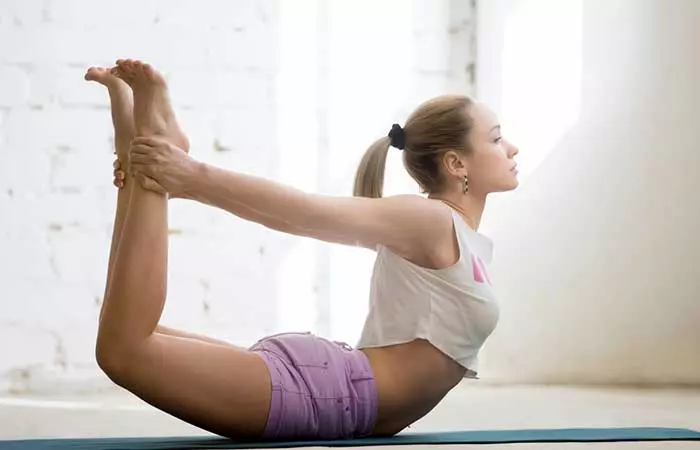
About The Pose- Dhanurasana or the Bow Asana is a pose that resembles a stringed bow ready to shoot. It is a beginner level Vinyasa yoga asana. Practice it in the morning on an empty stomach for best results and hold the pose for 15 to 30 seconds during practice.
 Quick Tip
Quick TipBenefits For The Chest- Dhanurasana massages your heart and cures asthma. It is perfect for relieving stress and fatigue. The pose opens up your chest, neck, and shoulders.
How To Perform
- Lie on your stomach, arms at your sides.
- Bend your knees backward and grasp your ankles.
- Inhale, lifting your chest and thighs while pulling your ankles higher.
- Hold the pose briefly, then slowly release.
4. Bitilasana (Cow Pose)
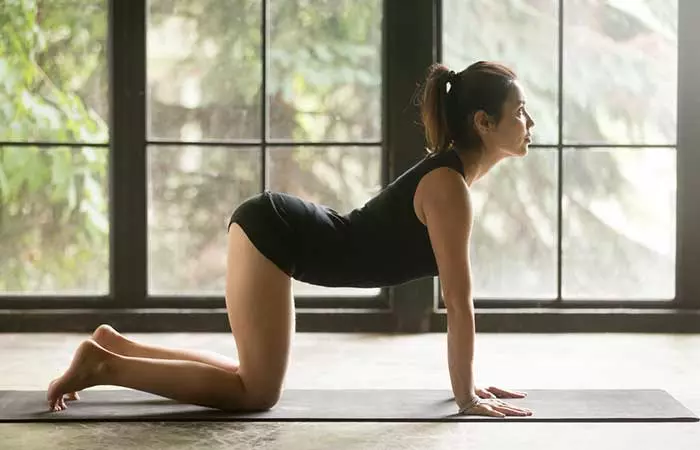
About The Pose- Bitilasana or the Cow Pose is an asana that resembles the stance of a cow. The Sanskrit word ‘Bitila’ means cow. Bitilasana is a beginner level Vinyasa yoga asana. Practice it in the morning or evening on an empty stomach and hold the pose for 10 to 15 seconds.
Benefits For The Chest- Bitilasana improves your posture and balance. It strengthens your neck and stretches your back. The pose calms your mind and aids in stress relief. It also increases the blood circulation in the body.
How To Perform
- Get on your hands and knees in a tabletop position.
- Inhale, arch your back and lift your head and tailbone.
- Push your belly toward the floor.
- Hold for a few breaths, then return to the original position.
5. Ustrasana (Camel Pose)
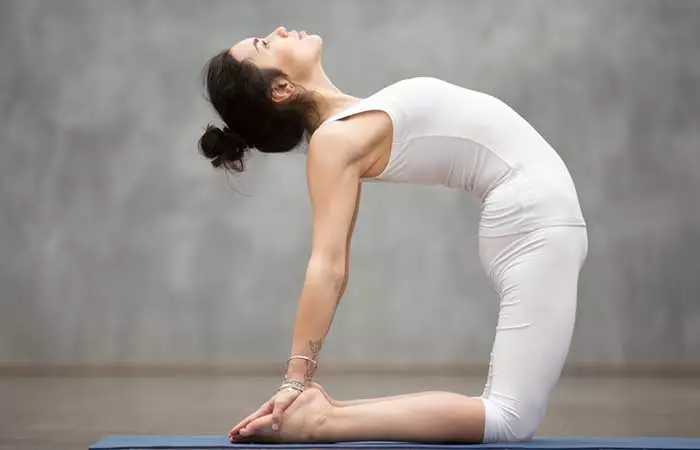
About The Pose- Ustrasana or the Camel Pose is a backbend that resembles the stance of a camel. The Sanskrit word ‘Ustra’ means camel. It is a beginner level Vinyasa yoga asana. Practice it in the morning on an empty stomach and hold the pose for 30 to 60 seconds.
Benefits For The Chest- Ustrasana stretches and strengthens your shoulders and back. It opens up your chest and improves respiration. The pose tones your neck and stretches your throat.
How To Perform
- Kneel placing your knees hip-width apart and hands on your ankles .
- Inhale, arch your back and lift your chest.
- Keep holding your ankles as you lift your chest.
- Hold the pose for a few seconds, then return to the kneeling position.
6. Chakrasana (Wheel Pose)
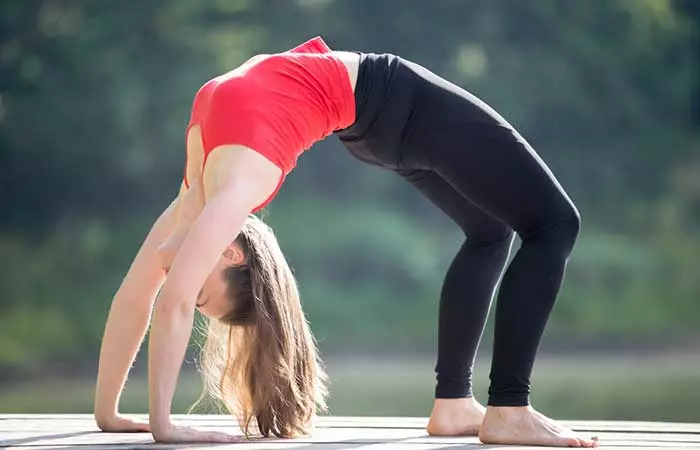
About The Pose- Chakrasana or the Wheel Pose is an asana that looks like a wheel. It is also an important step in acrobatics. Chakrasana is a beginner level Ashtanga yoga asana. Practice it in the morning on an empty stomach and hold the pose for 1 to 5 minutes.
 Quick Tip
Quick TipBenefits For The Chest- The pose is good for your heart and cures asthma. It stretches your lungs and stimulates the thyroid. It cures depression and relieves stress and tension in the body.
How To Perform
- Lie on your back with your knees bent and feet flat on the ground.
- Place hands beside your head, fingers toward your shoulders.
- Press into hands and feet, lifting hips and chest.
- Hold briefly, then lower back down.
7. Natarajasana ( Dance Pose)
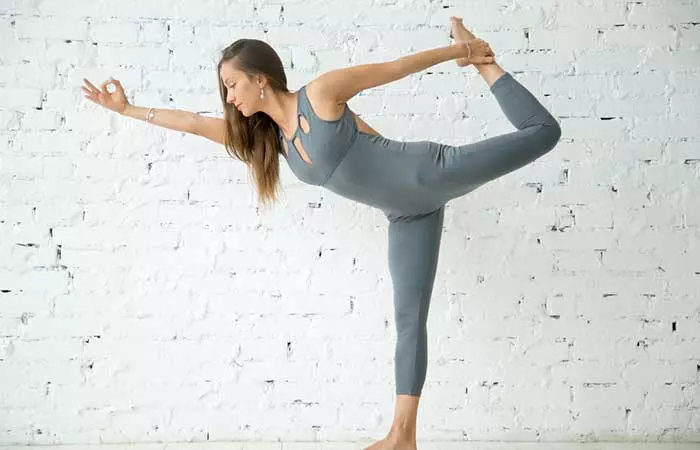
About The Pose- Natarajasana or the King Dancer Pose is an asana that resembles the dancing pose of Lord Shiva. It is an intermediate level Vinyasa yoga asana. Practice it in the morning or evening on an empty stomach and hold the pose for 15 to 30 seconds during practice.
Benefits For The Chest- Natarajasana stretches your neck muscles and strengthens your chest. It improves the flexibility of your body and also improves your body’s balance.
How To Perform
- Stand on one leg, bending the other leg at the knee, grasping its ankle.
- Inhale, lifting your chest and extending your free arm forward.
- Kick your back foot into your hand while balancing.
- Hold the pose for a few seconds, then switch sides.
8. Tadasana (Mountain Pose)
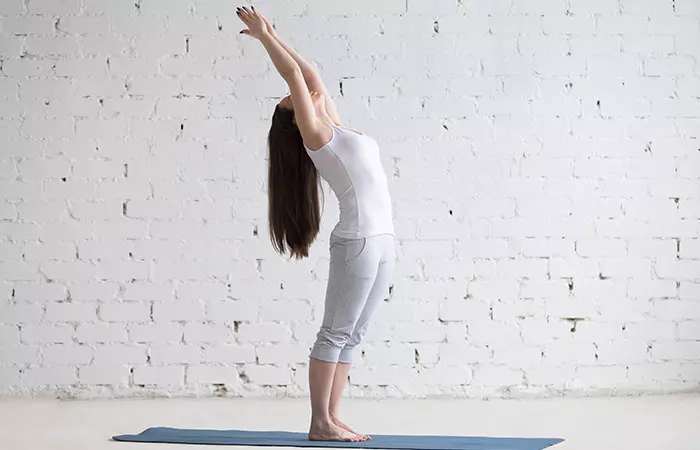
About The Pose – The Tadasana or the mountain pose is a simple standing pose that forms the base of other advanced standing yoga poses and can be done daily. It improves posture, stability, and endurance. Stand hip-width apart and roll your shoulders back or stretch your arms above, extending a little behind and bending backward from your waist to completely open up your chest. Start with holding it for 30 seconds and gradually increase it to 3-5 minutes or more.
Benefits For The Chest – It is a great posture for stretching and strengthening the upper body, especially the shoulder and chest muscles. It relieves tension in these areas, improves breathing, and may help relieve chest pain.
Now that you know all about the Yoga poses relieving chest tightness, let’s answer some common queries on yoga and chest pain.
How To Perform
- Stand with feet together and arms at the sides.
- Distribute your weight evenly across both feet.
- Inhale, stretching your arms overhead.
- Stretch out your spine and hold for a few breaths.
Infographic: Top Yoga Asanas To Soothe Chest Pain
Chest pain may be an underlying sign of an improper posture problem. Fear not, you can correct your stance with the right mix of exercise and lifestyle changes. Yoga is an excellent form of exercise that will help you target your upper body muscles effectively.
Check out the infographic below to learn more about the best yoga poses you can perform to soothe your chest pain. Illustration: StyleCraze Design Team
Chest pain and tightness can be due to bad posture, anxiety, stress, or digestive issues. Most often than not, breathing deep and easy, and following the simple yoga asanas mentioned above, can help relax your chest muscles, easing the pain and discomfort. Bhujangasana, Ustrasana, Natrajasana, and Matsyasana are a few of the popular yoga asanas effective for chest pain relief. Following the right posture, time, and amount of stretch is important while doing these yoga asanas. These exercises promote relaxation and wellness and also improve your meditation skills. Unless it is a medical emergency related to your cardiovascular health, these asanas can help you get rid of chest pain and tightness with regular practice over time.
Frequently Asked Questions
Can pranayama cure chest pain?
As per research, regular pranayama practice can help reduce stress and improve cardiovascular parameters, irrespective of age, gender, and BMI in helathy individuals (1). This may help resolve chest pain to a certain extent.
Can kapalbhati cause chest pain?
Yes, kapalbharti is a fast-paced pranayama technique that involves repeated forceful exhalations. If not done right, it may lead to chest pain and associated discomfort (2).
Is anulom vilom good for heart?
Studies suggest that slow breathing practices like anulom vilom pranayam can help reduce stress and improve your cardiac parameters (3).
Is vajrasana good for the heart?
Vajrasana helps support cardiac health by promoting blood circulation, regulating blood pressure levels, and reducing stress overall.
Is surya namaskar good for heart?
Yes, studies suggest that regular practice of surya namaskar promotes cardiorespiratory fitness (4).
Is Bhramari pranayama good for heart?
Studies on adolescents have shown that regular practice of Bhramari pranayama can help prevent stress-induced cardiovascular risks (5).
Watch the video below to learn how to relieve chest pain with yoga stretching exercises specially designed for costochondritis. Get relief from the discomfort and start feeling better today!
References
Articles on StyleCraze are backed by verified information from peer-reviewed and academic research papers, reputed organizations, research institutions, and medical associations to ensure accuracy and relevance. Read our editorial policy to learn more.
- Effect of short-term pranayama and meditation on cardiovascular functions in healthy individuals
https://pubmed.ncbi.nlm.nih.gov/22121462/ - Effects of Various Prāṇāyāma on Cardiovascular and Autonomic Variables – PMC
https://www.ncbi.nlm.nih.gov/pmc/articles/PMC5382821/ - Effect of short-term practice of pranayamic breathing exercises on cognition
anxiety - Acute effects of Surya Namaskar on the cardiovascular & metabolic system
https://pubmed.ncbi.nlm.nih.gov/21665111/ - Immediate Effects of Bhramari Pranayama on Resting Cardiovascular Parameters in Healthy Adolescents
https://www.ncbi.nlm.nih.gov/pmc/articles/PMC4948385/#:~:text=Conclusion
Read full bio of Sri Yogi Anand
Read full bio of Shirin Mehdi
Read full bio of Arshiya Syeda
Read full bio of Himanshi Mahajan







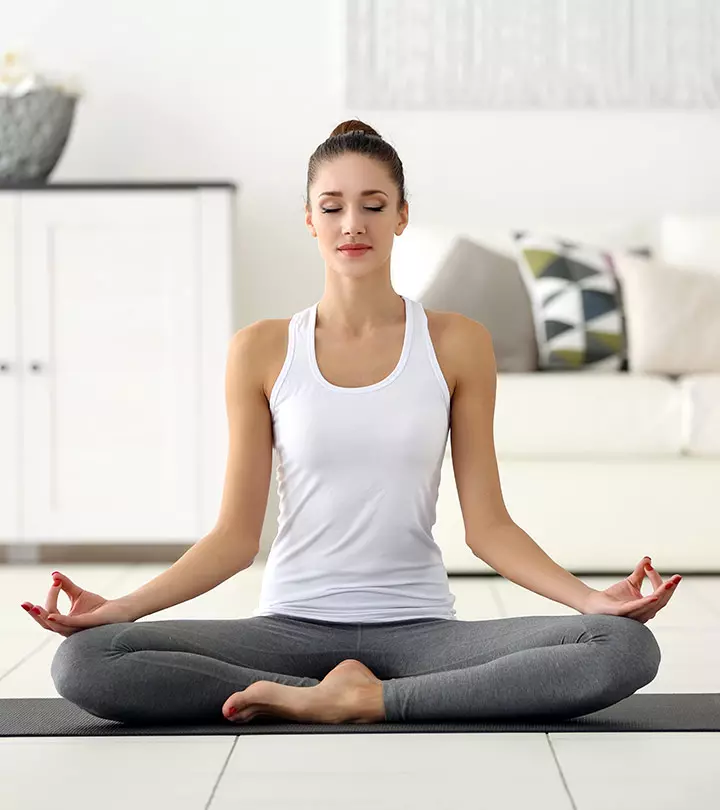



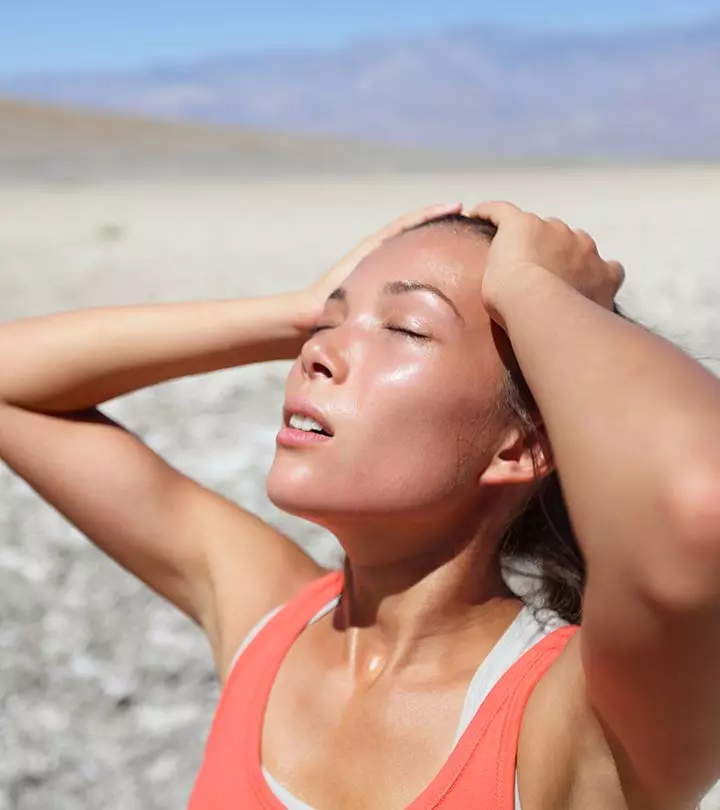
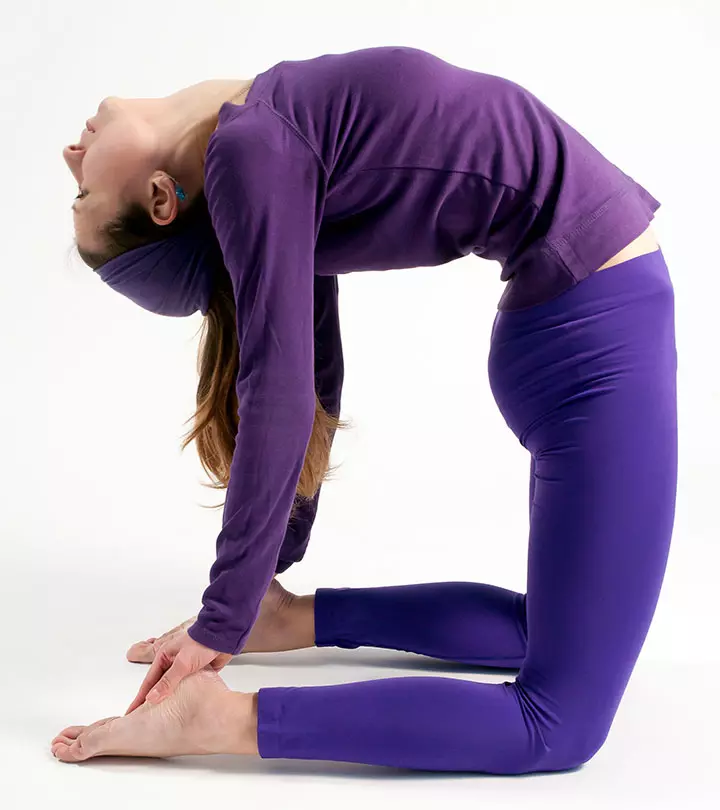
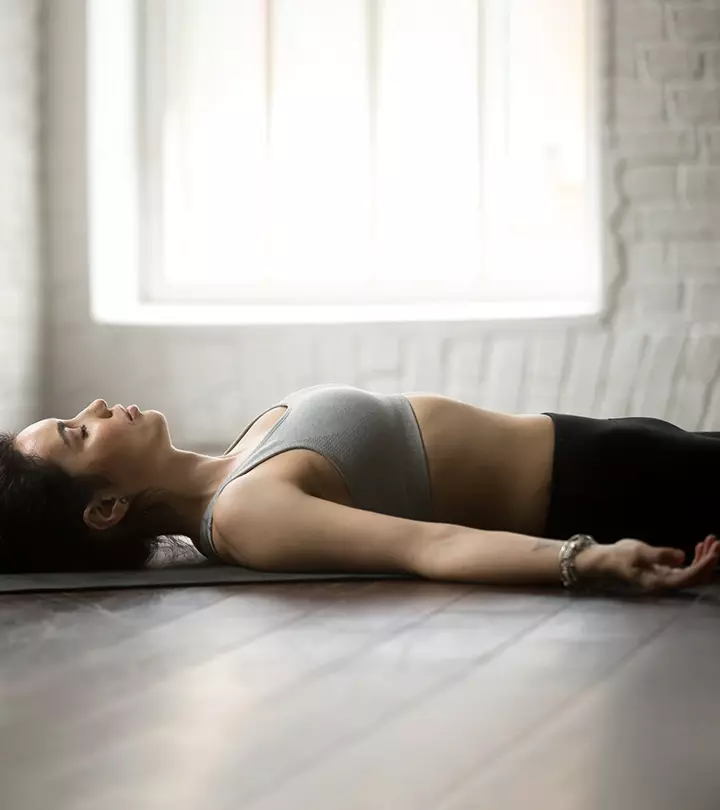
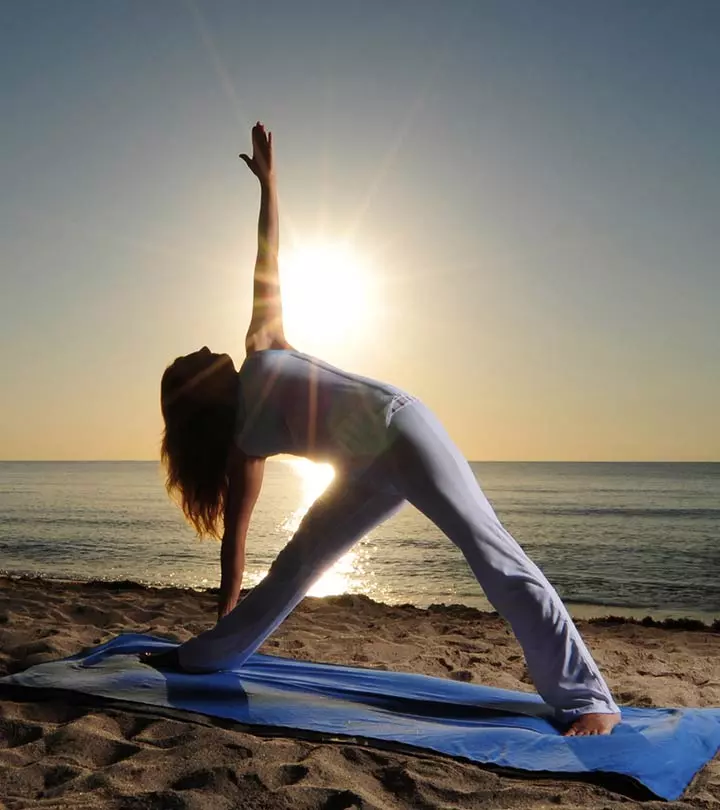













Community Experiences
Join the conversation and become a part of our empowering community! Share your stories, experiences, and insights to connect with other beauty, lifestyle, and health enthusiasts.